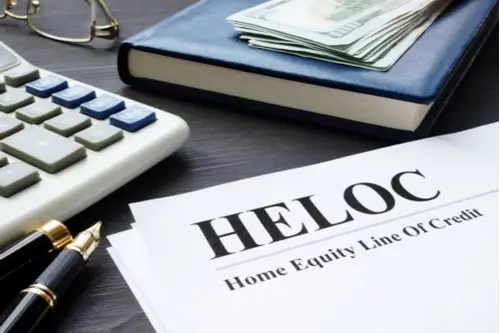

With home prices soaring over the past few years, homeowner equity is at all time highs. It could be a great time to tap into some of that equity to pay off debts or finally make those home improvements you’ve been dreaming about. One of the most common ways to borrow against your home’s value is by taking out a home equity line of credit (HELOC), but if you’re looking to get any other loans soon you should know how a HELOC might affect your credit score.
HELOC Loans Defined
A home equity line of credit is a revolving credit line that uses your home equity as collateral. It works much like a credit card but has dramatically lower interest rates. For the first 10 years of the loan, called the draw period, borrowers can pull out money on an as-needed basis. So, if you are taking on a kitchen renovation project, you can pay for materials and contractors over the course of the process instead of pulling out one large lump sum at the beginning. The benefit of this method is that you only pull out what you need, when you need it.
During this initial period, you can carry a balance from month to month and only make minimum payments if you prefer. After the 10 years are up, you will no longer be able to pull out money, but will have to start repaying the loan in full, including both interest and principal. The repayment phase usually lasts 20 years.
How Does a HELOC Affect Credit?
Applying for a HELOC will generally require a credit check which might cause a slight ding (5-10 points perhaps) to your score. This is only temporary, however, and the impact will be minimal if you haven’t applied for other types of credit recently. While the inquiry will show up on your credit report for two years, your credit score should go back up after just six months.
Because it is an open line of credit, the HELOC will be reported to the credit agencies as revolving debt, instead of as a second mortgage. Your credit report will include your loan balance, credit line, and payment history, just like with credit card accounts. However, the amount of available credit on your HELOC is not used to calculate your score when you apply for other types of loans.
How the loan affects your credit profile depends entirely on the way you manage your account. If you miss payments, your score could take a significant hit, but if you are timely, your credit score could actually get a boost over the years.
Your score will go down when you close the HELOC account because part of your credit profile has to do with your credit utilization rate. This is defined as how much of your available credit lines you have currently borrowed. When you close your HELOC loan, your total available credit limit will fall considerably, and your credit utilization will automatically increase. The impact is largest on those with short credit histories. The longer you hold on to the loan, the less influence closing it will have on your credit score.
A HELOC mortgage loan can be a very helpful way to accomplish your projects or financial goals, as long as you are aware of the effect it will have on your credit over the next several years.
